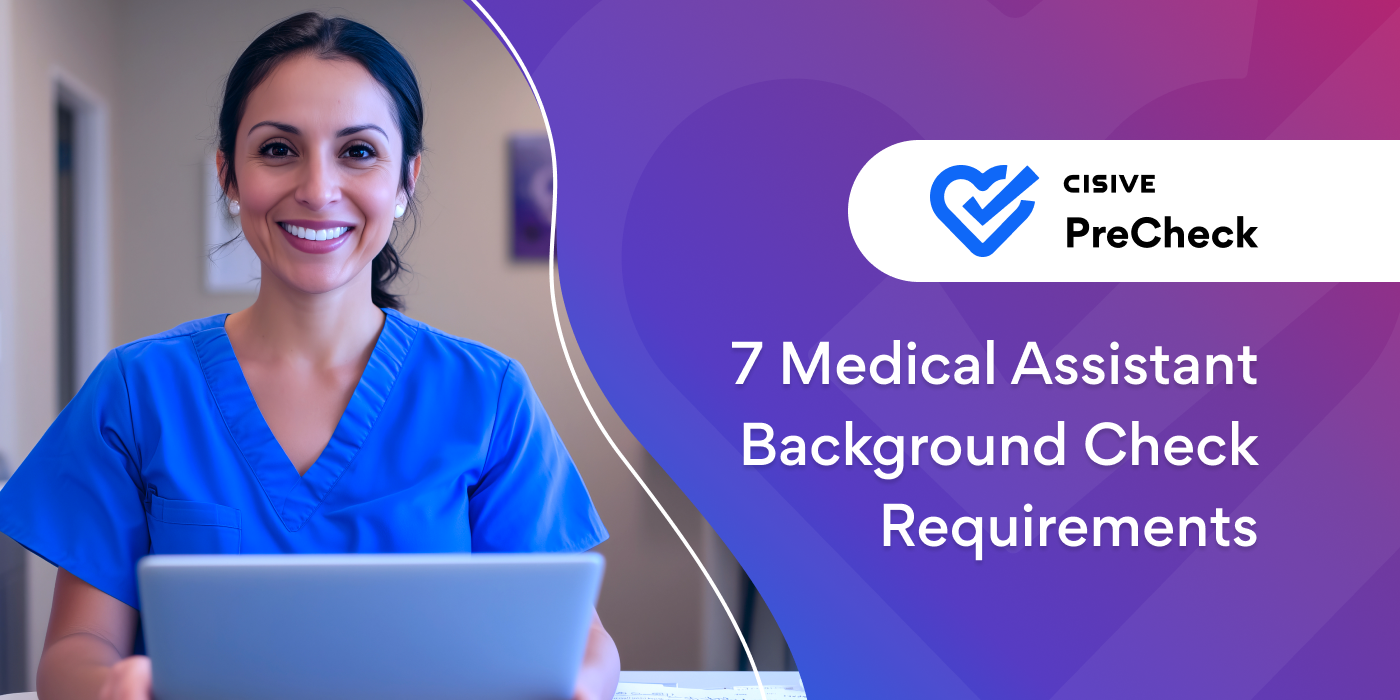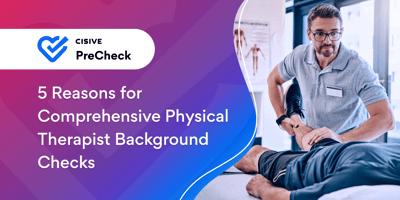

It's important to understand and comply with your state's healthcare background check requirements....

Every medical assistant plays a central role in handling confidential data and interacting with patients. As a result, they directly impact the level of patient care and safety in your facility. Hiring someone who doesn’t understand privacy regulations or who is lax on safety can ruin your organization reputationally and financially.
If you don’t have a plan for a background check for medical assistants, you leave your organization vulnerable to legal and ethical consequences. A comprehensive check ensures that your staff upholds the highest standards of integrity and professionalism, fostering a safer environment for everyone involved.
Key TakeawaysHere’s what you need to know about background checks for medical assistants:
|
A background check for medical assistants verifies an applicant's qualifications, criminal history, and professional background. It helps you ensure patient safety and regulatory compliance.
Background checks include criminal record searches, license verification, and employment and education histories. They involve drug screening and checks against healthcare-specific databases.
Conducting a proper healthcare background check gives you insights into an applicant's trustworthiness and competence. It protects your medical facility from liability and maintains a safe healthcare environment. It also ensures that all medical assistants meet industry standards and uphold patient confidentiality.

Employers must be confident that their staff is capable of performing highly technical, high-level jobs that center on patient care and confidentiality. Here’s why a comprehensive background check for medical assistants is important in meeting this objective:
Keeping patients and staff safe should be one of your highest priorities. Background checks do this by identifying past cases of assaults, drug offenses, or sexual misconduct. Identifying these individuals during screening can mitigate the risk of hiring someone who may perform these acts in your healthcare environment.
Reference checks can also mitigate this risk. Contacting previous employers gives you insights into past incidents that may not show up on criminal records.
Example: If a candidate has a history of license suspension due to substance abuse, you may consider disqualifying the candidate for your healthcare role.
Patients need to know they will be safe in your care. Background checks reassure patients that they’re receiving care from professionals who have undergone thorough vetting. When patients know you prioritize safety, they’re more likely to trust your facility with their healthcare needs.
Background checks instill confidence in staff, too. Coworkers have to trust each other to care for patients and adhere to facility guidelines. Transparency about your hiring practices improves your organization's reputation among the public and among applicants.
Example: Posting information about your exclusion screening process on your website can reinforce this trust. Consider training staff on how to communicate your safety measures when they interact with patients.
Let’s say an employee harms a patient, and it’s later revealed that your hiring team did not perform adequate screening. Your organization could face severe legal repercussions and fines. Penalties could also include costly lawsuits and potential settlements that create an overwhelming financial burden.
Example: Say you hired someone who later gave away a patient’s private medical information. Later, you discover that the background check missed that they were on an exclusion list. Your organization is then sued by the patient, costing you hundreds of thousands of dollars.
Your organization’s reputation is what attracts patients and retains talent. Conducting background checks solidifies that reputation by securing qualified individuals to join your team. A single incident involving an improperly vetted employee can lead to negative publicity that damages your standing in the community.
Example: Without proper screening, you hire a medical assistant with a history of unethical behavior. They engage in misconduct that results in media coverage. As a result of the damage to your organization’s image, patients seek care elsewhere.
Background checks incur upfront costs, such as fees for criminal record searches or license verifications. However, they save money by reducing long-term hiring expenses and turnover. Hiring the wrong candidate can lead to costly investments that go to waste if the candidate doesn’t stay.
Example: You hire a medical assistant who proves unfit due to falsified credentials. Consequently, you have to restart the hiring process, paying for more advertising, interview time, and training resources.
Background checks for medical assistants are similar to other checks. Before officially hiring, you want to ensure all the information you have is accurate. You start with identity verification, education history (including licensing), and criminal and drug checks.
Because these candidates will work in healthcare, there are more precautions. Check your applicant against federal and state lists of professionals who are no longer allowed to work in healthcare (called “exclusion lists”). You’ll also need to check their immunization records to ensure they are vaccinated as required by law.
Background checks are mandatory under HIPAA and many state healthcare regulations. Running background checks helps you maintain Joint Commission accreditation and mitigate liability risks.
As the HR manager, hiring manager, or employer, you're responsible for initiating FCRA-compliant background checks through your HIPAA-certified screening vendor. Your CMS (Centers for Medicare and Medicaid Services) compliance officer should review results to maintain Medicare/Medicaid eligibility.
You’ll want to draw from FCRA-compliant background check providers like Cisive that specialize in healthcare screenings. These pull from primary sources, like government exclusion lists, educational institutions, and federal and state criminal records.
While medical assistant licensure isn't required in every state, certification screening is important for your hiring process. Verify credentials like Certified Clinical Medical Assistant (CCMA), Registered Medical Assistant (RMA), or Certified Medical Assistant (CMA) through primary source verification.
Checking certifications ensures candidates meet industry standards, possess up-to-date skills, and comply with state regulations.

As an employer in a medical facility or business, you’re required to perform a thorough evaluation of every candidate applying to your organization. Let’s take a closer look at what this entails.
Verification involves checking government-issued identification documents, such as a driver’s license or passport, against the information provided by the candidate. Using biometric methods like facial recognition or fingerprint scanning confirms that the individual presenting the ID matches the documentation.
Identity verification must comply with regulations such as HIPAA and the FCRA.
Verification prevents identity fraud and allows only qualified individuals to gain access to sensitive patient information. This reduces the risk of hiring someone who has stolen an identity and would now have access to confidential patient information.
Confirm the candidate’s educational credentials by checking the institutions attended, degrees earned, and relevant licensing and certifications. Verification involves contacting schools directly or using services like the National Student Clearinghouse to obtain records of attendance and graduation dates.
Education and employment verification prevents hiring individuals with false claims about their qualifications, which could lead to lawsuits alleging negligent hiring. You verify that candidates possess the necessary skills and knowledge to provide quality patient care in medical facilities.
Cisive PreCheck offers background screening designed to help your organization onboard qualified talent while maintaining safety and compliance. The platform provides a suite of services, including education verification, license monitoring, and drug testing.
If possible, utilize the FBI’s Criminal Justice Information Services (CJIS) database, which provides access to nationwide criminal history records. You can also use accredited third-party screening services that are compliant with the FCRA. You’ll gain access to accurate information regarding any disqualifying convictions or pending cases.
A national criminal background check is vital for maintaining patient safety and minimizing liability risks. Identifying potential red flags protects your organization from hiring individuals who are a threat to patients or staff. Thorough checks help create a secure environment in your medical facility.
To ensure the candidate can legally practice medicine, make sure they are not on these lists:
Screening involves verifying candidates against these databases to identify any individuals barred from participating in federally funded healthcare programs.
Conducting sanctions screening keeps patients safe and keeps your organization within compliance guidelines. Hiring individuals on exclusion lists can lead to civil penalties and loss of eligibility for Medicare and Medicaid programs. By implementing regular checks, you protect your organization from these legal risks.
Cisive PreCheck streamlines sanctions and exclusions screening by providing access to essential databases like the LEIE and SAM. It verifies candidates against these lists and keeps you compliant with federal regulations.
The FCRA requires obtaining written consent from candidates before conducting background checks. Familiarize yourself with state-specific laws that may impose additional requirements, such as reporting limits on criminal records or specific disclosures.
Obtain written consent from candidates before conducting screenings, and follow proper procedures if you take adverse action.
Following these regulations protects your organization from legal issues. Non-compliance can lead to fines, lawsuits, or loss of accreditation. Implementing thorough processes that align with federal and state regulations promotes compliant hiring practices that safeguard your organization.
Screen candidates against various government watch lists, including those maintained by the Office of Foreign Assets Control (OFAC) and the Terrorist Screening Center. You’ll identify individuals barred from entering or conducting business in the U.S. due to security concerns.
Hiring individuals linked to terrorism or other criminal activities can lead to severe legal repercussions and reputational damage. By implementing watch list screenings, you promote a safer environment and comply with federal regulations in healthcare hiring practices.
Implement lab-based drug screening to assess candidates for substance abuse, focusing on common substances such as THC, cocaine, and opiates. Testing occurs after you obtain written consent from the applicant and should be part of a comprehensive pre-employment screening.
Medical assistants have access to medications and work directly with patients. Because of this, you need to verify that they’re sober while performing their duties. Integrating drug testing into your hiring process reduces the risk of workplace incidents and can lower the chance of staff stealing medication for personal use.
Cisive PreCheck simplifies drug testing for hiring medical assistants by providing screening services that comply with healthcare regulations. The platform offers various testing methods for accurate results.
Healthcare background check services such as Cisive’s PreCheck help you make informed decisions when considering job candidates. Our service helps you protect your facility's reputation while simplifying your background check process.
With PreCheck, you gain access to a platform that offers highly accurate information through multiple databases and verification sources. You can be confident in the results and know that you’re in compliance with industry regulations.
At the same time, you can easily address key pain points in the hiring process. You'll reduce time-to-hire, minimize compliance risks, and improve the quality of your hires. Keep your patients, staff, and organization safe with PreCheck.
Running a background check for medical assistants is critical to your healthcare organization’s long-term security and success. PreCheck gives you the tools you need to hire safe, dependable medical assistants who’ll provide your patients the highest level of healthcare. Learn more about PreCheck by scheduling a demo with an expert.
Author: Jenni Gallaway
Bio: Content Marketing Manager at Cisive. 8 years of experience in the background screening industry.
Let's Connect on LinkedIn
It's important to understand and comply with your state's healthcare background check requirements....

Do you trust the physical therapists you hire? They work directly with patients and need to deliver...

While employers are evaluating background screening services or making policy decisions about...